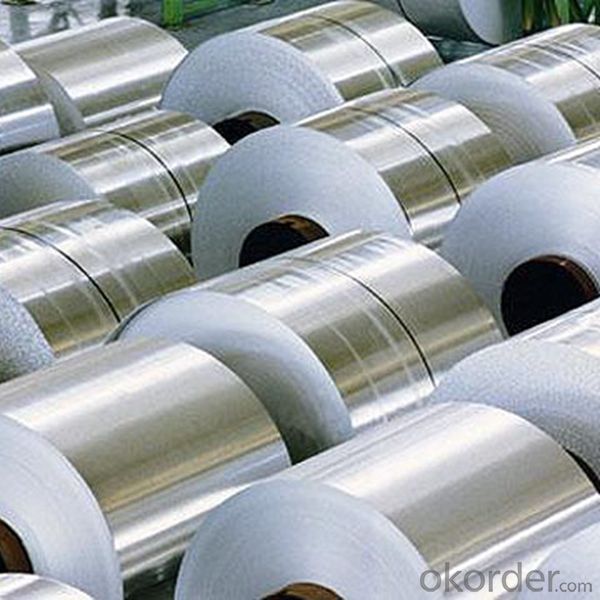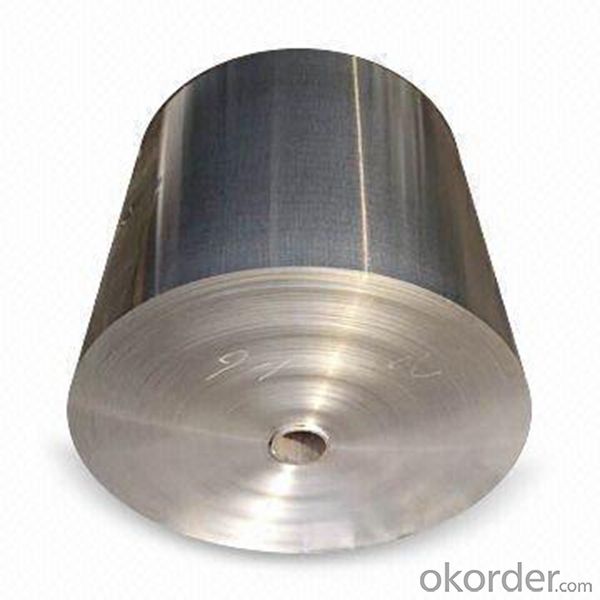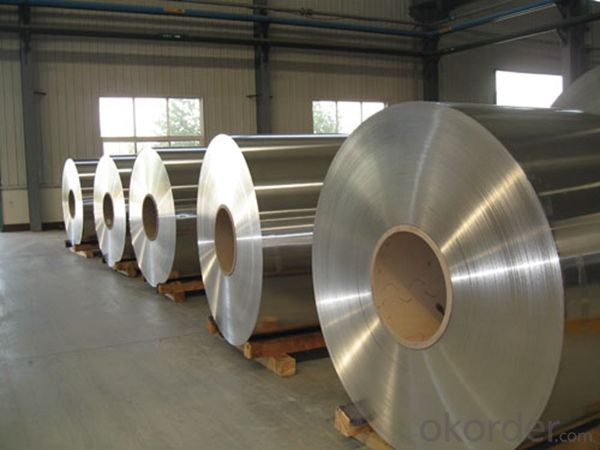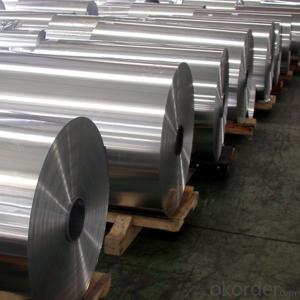Polished Mill Finished Aluminum Rolls for Metal Walls
- Loading Port:
- Shanghai
- Payment Terms:
- TT OR LC
- Min Order Qty:
- 5 m.t.
- Supply Capability:
- 10000 m.t./month
OKorder Service Pledge
OKorder Financial Service
You Might Also Like
Item specifice
1. Specification of Polished Mill Finished Aluminum Rolls for Metal Walls
characteristics | Application |
1) Super peeling strength | 1) Building exterior curtain walls |
2) Excellent surface flatness and smoothness | 2) Decoration and renovation additions for old buildings |
3) Superior weather, corrosion, pollutant resistance | 3) Decoration of interior walls, ceilings, bathrooms, kitchens and balconies |
4) Even coating, various colors | 4) Shop door decorations |
5) Fireproof, excellent heat and sound insulation | 5) Advertisement board display platforms and signboards |
6) Superior impact resistance | 6) Wallboards and ceilings for tunnels |
7) Lightweight and easy to process | 7) Industrial materials, materials for vehicles and boats |
2. Application of Polished Mill Finished Aluminum Rolls for Metal Walls
(1).Interior: wall cladding, ceilings, bathrooms, kitchens and balconies, shutters, doors...
(2).Exterior: wall cladding, facades, roofing, canopies, tunnels,column covers , renovations...
(3).Advertisement: display platforms, signboards, fascia, shop fronts...
3. Feature of Polished Mill Finished Aluminum Rolls for Metal Walls
*Such coil is specially designed to replace aluminum ingot, due to the high export tax of aluminum ingot, the coil has better price than ingot.
*This type of coil can fit customer's remelting furnace just like ingot, no need to make any change to the production line that was previously used for ingot. The standard coil size and weight is very suitable for the feed gate of furnace.
*This type of coil causes less material wastage than ingot when remelted.
*Our coil is made directly from ore, no need to go though the ingot making process, quality is much better than other suppliers who use ingot scrap to make coil.
Be free from Oil Stain, Dent, Inclusion, Scratches, Stain, Oxide Dicoloration, Breaks, Corrosion, Roll Marks, Dirt Streaks and other defect which will interfere with use
4. Certificate:
SGS and ROHS(if client request, paid by client), MTC(plant provided), Certificate of Origin(FORM A, FORM E, CO), Bureau Veritas and SGS (if client request, paid by client), CIQS certificate
5. Image of Polished Mill Finished Aluminum Rolls for Metal Walls



6. Package and shipping of Polished Mill Finished Aluminum Rolls for Metal Walls
eye to wall
eye to the wall
with wood pallet (wooded case also available)
7. FAQ
1) What is the delivery time?
Dpends on actual order, around 20 to 35 days
2)What is the QC system:
We have QC staff of 20 persons and advanced equipment, each production is with MTC traced from Aluminum ingot lot.
3) What market do you mainly sell to?
Australia, America, Asia, Middle East, Western Europe, Africa etc
- Q:Can aluminum coils be used in the production of aluminum garage doors?
- Aluminum garage doors can indeed incorporate aluminum coils. Due to its lightweight nature, durability, and resistance to corrosion, aluminum is widely favored as a material for garage doors. Typically, aluminum coils are employed to fabricate the panels and frames of these doors. These coils can be effortlessly molded and manipulated into the desired garage door design. Moreover, aluminum coils can be powder coated or painted to impart a polished appearance and enhance the visual appeal of the garage door. In conclusion, aluminum coils are a flexible and pragmatic option for the manufacturing of aluminum garage doors.
- Q:What are the potential applications of patterned aluminum coils?
- Patterned aluminum coils possess a wide array of possible applications across diverse industries. The construction industry, in particular, benefits greatly from the utilization of patterned aluminum coils. These coils find use in roofing, siding, and cladding applications. The patterned surface serves to augment the visual appeal of buildings while also providing added strength and durability. Another industry that can benefit from the implementation of patterned aluminum coils is transportation. These coils can be employed in the manufacture of automotive parts such as body panels, trims, and decorative accents. The patterned surface imparts a distinctive and stylish appearance to vehicles, all the while offering corrosion resistance and lightweight properties. Patterned aluminum coils can also be employed in the production of household appliances and furniture. They can be utilized to create decorative panels, cabinets, and countertops. The patterned surface can add a contemporary and sophisticated touch to these products, thereby rendering them more visually appealing to consumers. Moreover, patterned aluminum coils find applications in the packaging industry. They can be utilized in the fabrication of packaging materials such as cans, containers, and lids. The patterned surface can make the packaging more captivating, thereby aiding in attracting customers and bolstering sales. Furthermore, patterned aluminum coils can be incorporated into the production of signage and advertising materials. The patterned surface offers a unique and attention-grabbing appearance, which makes it ideal for crafting signage that stands out and effectively communicates messages. In summary, the potential applications of patterned aluminum coils are extensive and diverse. From construction to transportation, household appliances to packaging, and signage to advertising, these coils offer a versatile solution for enhancing aesthetics, durability, and functionality across various industries.
- Q:What are the typical lead times for aluminum coil orders?
- The typical lead times for aluminum coil orders can vary depending on several factors. Generally, lead times for standard aluminum coil orders range from a few weeks to a few months. These lead times are influenced by factors such as the size and complexity of the order, the availability of raw materials, the production capacity of the supplier, and any specific customization requirements. It is important to note that lead times may be longer for larger or more specialized orders, especially if they require additional processing or finishing. Additionally, external factors such as transportation and logistics can also impact lead times. It is always recommended to communicate with the supplier directly to get an accurate estimate of the lead time for a specific aluminum coil order.
- Q:Can aluminum coils be used in HVAC heat exchangers?
- Yes, aluminum coils can be used in HVAC heat exchangers. Aluminum is a popular choice for heat exchangers due to its excellent thermal conductivity, light weight, and corrosion resistance. Aluminum coils are often used in air conditioning systems and heat pumps, where they transfer heat efficiently between the refrigerant and the surrounding air. Additionally, aluminum coils are easier to shape and form, allowing for more intricate designs and better heat transfer performance. Overall, aluminum coils are a reliable and effective choice for HVAC heat exchangers.
- Q:Are there any limitations to the minimum coil width of aluminum coils?
- Yes, there are limitations to the minimum coil width of aluminum coils. These limitations depend on various factors such as the type and thickness of the aluminum, the specific manufacturing process, and the equipment used. Generally, the minimum coil width is determined by the capabilities of the rolling mills or slitters used in the production process. These machines have certain minimum width settings that cannot be exceeded. Additionally, extremely narrow coil widths may pose challenges in terms of handling, transportation, and processing.
- Q:How are aluminum coils coated for color matching and aesthetic purposes?
- The process of coil coating is commonly used to coat aluminum coils for color matching and aesthetic purposes. It is a continuous and highly automated process where a layer of paint or coating is applied onto the surface of the aluminum coil. To start the coil coating process, the aluminum coil is thoroughly cleaned to remove dirt, grease, and oxidation. This is done using chemical cleaning agents and mechanical scrubbing methods to ensure a clean and smooth surface. Once the cleaning process is complete, a primer is applied to the aluminum coil. The primer acts as a bonding agent, improving the adhesion of the subsequent layers of paint or coating. It also helps to prevent corrosion on the aluminum surface. After the primer is applied, the aluminum coil undergoes a series of rollers where the desired color coating is applied. This can be done through various methods such as coil coating, spray coating, or powder coating. Coil coating is the most common method, involving the application of a liquid paint or coating onto the metal coil surface. The coating is then cured or dried using heat to ensure proper adhesion and durability. In order to achieve color matching and aesthetic purposes, the paint or coating used is often customized to specific color palettes or customer requirements. This customization is achieved by using a wide range of pigments and additives that alter the color, texture, and gloss level of the coating. Furthermore, specialized coatings can be applied to aluminum coils to enhance their aesthetic properties. For example, there are coatings available that give the appearance of natural wood or stone, providing a more visually appealing finish. Overall, the process of coating aluminum coils for color matching and aesthetic purposes involves thorough cleaning, priming, and the application of customized paint or coatings. This ensures that the aluminum coils meet the desired aesthetics while also providing durability and protection against corrosion.
- Q:What are the typical applications of aluminum coils in the automotive industry?
- Aluminum coils are widely used in the automotive industry for various applications due to their advantageous properties. One typical application is in the manufacturing of automotive heat exchangers, such as radiators and condensers. The high thermal conductivity of aluminum allows for efficient heat transfer, enhancing the cooling efficiency of the vehicle's engine and air conditioning system. Another common use of aluminum coils in the automotive industry is for making lightweight body panels and structural components. Aluminum is known for its low density, which helps reduce the overall weight of the vehicle. This, in turn, improves fuel efficiency and reduces emissions. Additionally, aluminum's high strength-to-weight ratio makes it ideal for impact-absorbing structures, enhancing the safety of the vehicle. Aluminum coils are also utilized in the production of electrical wiring systems and connectors in automobiles. Aluminum's excellent electrical conductivity enables the efficient transmission of electrical signals throughout the vehicle. Furthermore, its corrosion resistance properties make it suitable for use in various weather conditions. Moreover, aluminum coils find application in the production of suspension systems, such as control arms and knuckles. The stiffness and durability of aluminum help enhance the vehicle's handling and responsiveness, resulting in improved driving dynamics. In summary, the typical applications of aluminum coils in the automotive industry include heat exchangers, lightweight body panels, electrical wiring systems, and suspension components. These applications capitalize on aluminum's advantageous properties, such as high thermal conductivity, low density, excellent electrical conductivity, and corrosion resistance.
- Q:How are aluminum coils used in the production of food processing equipment?
- Due to their desirable characteristics and benefits, aluminum coils are extensively utilized in the manufacturing of food processing equipment. These coils are typically crafted from high-quality aluminum alloy, which offers exceptional heat conductivity, resistance to corrosion, and long-lasting durability. A primary application of aluminum coils in the food processing industry involves their incorporation into heat exchangers. These heat exchangers serve as vital components within various food processing equipment, including ovens, fryers, and refrigeration systems. The aluminum coils housed within these heat exchangers facilitate the efficient and precise transfer of heat between different mediums, ensuring optimal temperature control during food processing. Another significant application of aluminum coils lies in the production of evaporator coils. These coils are essential to the refrigeration systems employed in commercial food processing. By absorbing heat from the surrounding environment and allowing refrigerants to evaporate, the aluminum evaporator coils contribute to the cooling process, thereby maintaining low temperatures within the equipment. Aluminum coils also find utility in the construction of food storage and transportation equipment, such as refrigerated trucks and containers. The lightweight nature of aluminum aids in fuel efficiency and facilitates the easier transportation of food products while preserving their quality and freshness. Moreover, aluminum coils are highly regarded for their hygienic properties and ease of cleaning, making them an excellent choice for food processing equipment. Aluminum surfaces can be easily sanitized, ensuring a high standard of cleanliness and preventing contamination during food production. In summary, aluminum coils play a crucial role in the manufacturing of food processing equipment by providing exceptional heat transfer, corrosion resistance, durability, and hygienic qualities. Their utilization contributes to efficient food processing operations, optimal temperature control, and the maintenance of food quality and safety standards.
- Q:What is the difference between pre-painted and natural aluminum coils?
- There are two types of aluminum coils used in various industries: pre-painted and natural. The surface finish is the main distinguishing factor between these two types. Pre-painted aluminum coils are coated with paint or a protective coating before delivery. This coating is applied in a controlled environment, ensuring a uniform and durable finish. The advantages of pre-painted coils include increased resistance to corrosion, improved appearance, and better ability to withstand weather conditions. They also offer a wide range of color options, which makes them suitable for architectural applications where color matching is important. On the other hand, natural aluminum coils remain untreated and maintain their original metallic appearance. These coils are commonly used in applications where the natural aluminum finish is desired, such as in the production of consumer electronics, automotive parts, and other industrial products. Natural aluminum coils are known for their excellent thermal conductivity, lightweight nature, and high strength-to-weight ratio. In conclusion, the difference between pre-painted and natural aluminum coils lies in their surface finish. Pre-painted coils have a protective layer of paint, providing improved resistance to corrosion, better appearance, and color choices. Natural aluminum coils, on the other hand, retain their original metallic appearance and are often preferred in applications where the natural aluminum finish is desired.
- Q:Are there any limitations on the coil flatness of aluminum coils?
- Aluminum coils, like other metal coils, have limitations on their flatness. The flatness of a coil refers to the extent to which its surface deviates from being completely flat. The American Society for Testing and Materials (ASTM) has set standards for measuring and evaluating the flatness of metal coils, including aluminum coils. These standards provide guidance for manufacturers, suppliers, and customers in determining the acceptable level of flatness for a particular application. The acceptable flatness of aluminum coils can vary depending on factors such as coil thickness, aluminum grade, and intended use. Thinner coils generally have stricter flatness requirements than thicker ones due to their greater susceptibility to distortion and waviness. Coil manufacturers employ various techniques, such as tension leveling, roller leveling, and corrective leveling, to control and improve flatness. These processes help to minimize or eliminate any deviations in flatness that may occur during coil manufacturing or processing. It is important to understand that achieving perfect flatness in aluminum coils is not always possible due to the inherent properties of the metal. Aluminum tends to exhibit some degree of natural springback, which can result in slight variations in flatness. However, these variations typically fall within acceptable tolerances for most applications. Ultimately, the limitations on the flatness of aluminum coils depend on the specific requirements of the customer or industry. Effective communication and clear establishment of flatness specifications between manufacturers and suppliers are crucial to ensuring that the coils meet the desired quality standards.
1. Manufacturer Overview |
|
|---|---|
| Location | |
| Year Established | |
| Annual Output Value | |
| Main Markets | |
| Company Certifications | |
2. Manufacturer Certificates |
|
|---|---|
| a) Certification Name | |
| Range | |
| Reference | |
| Validity Period | |
3. Manufacturer Capability |
|
|---|---|
| a)Trade Capacity | |
| Nearest Port | |
| Export Percentage | |
| No.of Employees in Trade Department | |
| Language Spoken: | |
| b)Factory Information | |
| Factory Size: | |
| No. of Production Lines | |
| Contract Manufacturing | |
| Product Price Range | |
Send your message to us
Polished Mill Finished Aluminum Rolls for Metal Walls
- Loading Port:
- Shanghai
- Payment Terms:
- TT OR LC
- Min Order Qty:
- 5 m.t.
- Supply Capability:
- 10000 m.t./month
OKorder Service Pledge
OKorder Financial Service
Similar products
New products
Hot products
Hot Searches
Related keywords



























